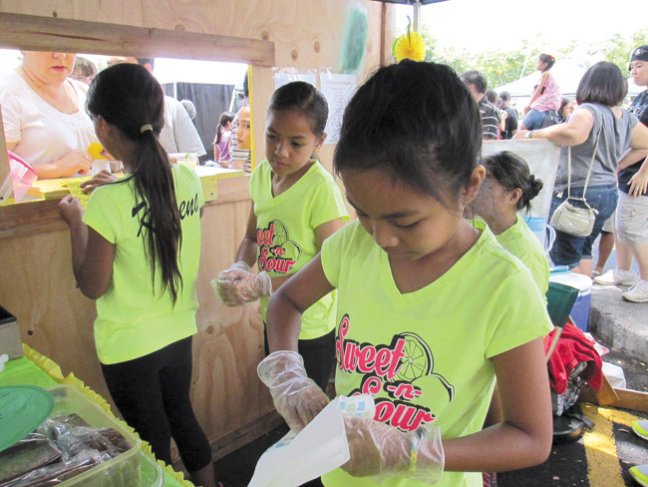The Power Of Lemonade
The annual Lemonade Alley contest teaches kids important business and leadership skills. But perhaps more significantly, it encourages them to give back
As a renowned investor, strategic illustrator and app developer, local entrepreneur Steve Sue has had a lot of fancy job titles. But for him, none of them can top his current title: chief lemon head of business education program Lemonade Alley.
mw-cover-012115-limonadealley-4
It’s through Lemonade Alley that he gets to lead children in creating lemonade stands as a way to teach them entrepreneurial skills, while also promoting the value of charitable giving. Each spring, students from K to 12 make their own lemonade, then sell their product in a contest held at Pearlridge Center. But these are no roadside lemonade stands — they’re full-fledged businesses, in which the kids have done everything from product development to marketing to finding investors. The young entrepreneurs then donate proceeds to nonprofit partners of their choice.
“We teach the kids all the tools of entrepreneurship, but also teach them that they can make a living yet still have enough to share with the rest of the world,” explains Sue, who founded Lemonade Alley.
Launched in 2011, Lemonade Alley is heading into its fifth year — and it’s looking to be bigger than ever. The timing, organizers feel, could not be better. Born out of the recession, Lemonade Alley instills kids with the skills to strike out on their own and create their own opportunities. Plus, Sue explains, kids today are gearing up for a different sort of job market — one where the job they take when they’re 22 isn’t the one that they’ll have for the next 30 years.
“At the same time,” Sue asserts, “there are a lot of technological tools that are allowing more people to be entrepreneurial out of their own homes. That is, in a sense, setting more people free to innovate.”
It’s all a part of a larger goal to promote small businesses and entrepreneurship.
Lemonade Alley is the flagship program of BizGym Foundation, which itself grew out of the BizGym software application Sue created to facilitate the development and fine-tuning of business plans.
“Essentially, what (BizGym software) does is it helps you create your business concept into something that touches on all of the key themes of business,” Sue explains. “It is an entrepreneur startup growth kit.”
BizGym guides users through this process via a business-planner tool, a marketing sales pitch map and a financial modeler.
The foundation was launched as the nonprofit arm to fund Lemonade Alley — and now is comprised of a range of programs that support entrepreneurial education and small-business growth.
As a companion program to Lemonade Alley, there is Camp BizGym, a marketing and video production boot camp that Lemonade Alley winners have the opportunity to attend. Kids work with public-relations consultants to produce videos that promote either a local business or their own venture.
BizGym also produces StoryU Arts, led by BizGym program director Kimee Balmilero, which uses acting, improv and script writing as a way to help professionals with public speaking and marketing.
Each November, in honor of National Entrepreneurship Month, there’s BizPitch Camp — a workshop that teaches budding entrepreneurs how to tailor their pitch to target various audiences.
BizGym’s newest program, Brand Aid, is designed to “fix your business brand boo boos.” Through an evaluation of a company’s overall image, Brand Aid helps executives understand how it all looks from a customer’s perspective. The program hosts pop up “triage” evaluation sessions, the next of which will be held Jan. 27 at Bishop Square. Once a quarter, Brand Aid also will offer informational sessions, covering topics such as promotion, product development, design, employee training and customer service.
“If we can turn a half-million-dollar-a-year business into a million-dollar business, we can create jobs and economic vitality,” Sue explains.
By introducing students to entrepreneurial concepts at a young age, Lemonade Alley hopes to plant the seeds for the type of work ethic and business savvy that they’ll need as adults.







